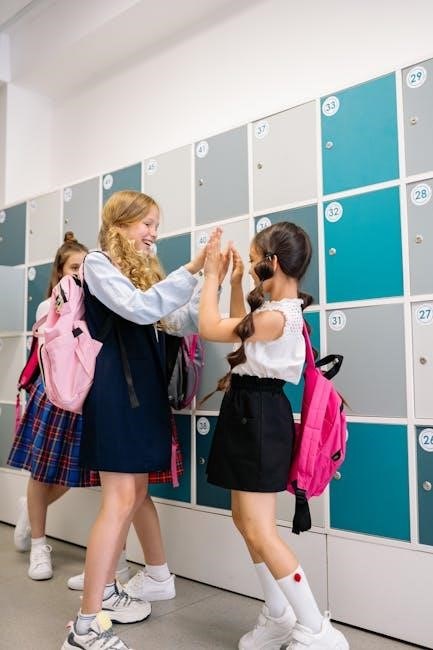Sean Covey’s The 7 Habits of Highly Effective Teens provides a roadmap for teens to master essential life skills‚ fostering confidence‚ relationships‚ and success in a fast-paced world.
Background of the Book
The 7 Habits of Highly Effective Teens is a self-help book authored by Sean Covey‚ first published in 1998 and updated in 2014. It adapts the timeless principles from his father Stephen Covey’s bestselling book‚ The 7 Habits of Highly Effective People‚ specifically for teenagers. The book addresses the unique challenges of adolescence‚ such as peer pressure‚ school stress‚ and family relationships‚ offering practical advice to help teens build self-esteem‚ improve relationships‚ and achieve personal success. Written in an engaging and relatable style‚ the book has become a trusted guide for millions of teenagers worldwide‚ providing tools to navigate the complexities of growing up in the modern world.

Why Teens Need These Habits
Teenagers face numerous challenges‚ including academic pressure‚ social dynamics‚ and identity formation. These habits provide a framework to navigate these complexities‚ fostering self-awareness‚ responsibility‚ and resilience. By adopting proactive approaches and prioritizing what matters‚ teens can build confidence and improve relationships. The habits also encourage empathy‚ collaboration‚ and personal growth‚ equipping them to make informed decisions and thrive in a rapidly changing world. Ultimately‚ these principles empower teens to become more effective in achieving their goals and creating a fulfilling future.

Habit 1: Be Proactive
Habit 1 emphasizes proactivity‚ encouraging teens to take control of their choices and actions‚ focusing on responsibility and initiative rather than being reactive to circumstances.
Understanding Proactivity
Proactivity is about taking initiative and being responsible for your own life. It involves making choices that align with your values‚ rather than reacting to circumstances passively. By focusing on what you can control‚ you empower yourself to create positive outcomes. Proactivity fosters resilience‚ helping you overcome challenges and achieve personal growth. It encourages you to think ahead‚ anticipate problems‚ and take action to prevent them. This mindset shifts your perspective from being a victim of circumstance to being the driver of your destiny‚ enabling you to lead a more purposeful and fulfilling life.
Practical Steps to Being Proactive
Being proactive starts with taking responsibility for your choices and actions. Identify what is within your control and focus on making positive decisions. Set personal goals and priorities to guide your behavior. Practice self-awareness by recognizing your thoughts and emotions‚ ensuring they align with your values. Develop a growth mindset‚ viewing challenges as opportunities to learn and grow. Additionally‚ take initiative in solving problems instead of waiting for others to act. By implementing these steps‚ you can cultivate a proactive mindset‚ empowering yourself to influence outcomes and create a more fulfilling life.

Habit 2: Begin with the End in Mind
This habit encourages setting clear‚ personal goals and creating a vision for your life‚ helping you stay focused on what truly matters and aligns with your values.
Setting Personal Goals
Setting personal goals is a crucial step in Habit 2‚ as it helps teens clarify their values and priorities. By identifying what matters most‚ they can create a roadmap for their future. This involves reflecting on short- and long-term objectives‚ ensuring they align with their personal values. Writing down specific‚ measurable‚ and achievable goals fosters accountability and direction. Teens are encouraged to visualize their ideal future and develop a personal mission statement‚ serving as a guide for decision-making. Regularly reviewing and updating these goals helps maintain focus and motivation‚ empowering teens to stay on track and achieve their aspirations.
Creating a Vision for Your Life
Creating a vision for your life is a powerful tool for self-discovery and direction. It involves imagining your ideal future and defining what success means to you. By reflecting on your values‚ passions‚ and long-term goals‚ you can craft a personal mission statement that guides your decisions. This vision serves as a roadmap‚ helping you stay focused on what truly matters. Regularly revisiting and updating your vision ensures it remains relevant as you grow. A clear vision not only inspires motivation but also aligns your actions with your aspirations‚ empowering you to live a purpose-driven life and make meaningful progress toward your dreams.
Habit 3: Put First Things First
Habit 3 focuses on effective time management‚ prioritizing tasks‚ and maintaining balance in life to achieve long-term goals and personal fulfillment.
Time Management for Teens
Effective time management is crucial for teens to balance school‚ extracurricular activities‚ and personal life. Sean Covey emphasizes prioritizing tasks using the “Time Management Matrix‚” focusing on urgent and important activities. Teens can use planners or digital tools to organize their schedules‚ reducing procrastination and stress. By learning to say “no” to non-essential tasks‚ they can allocate time wisely‚ ensuring productivity and personal growth. This habit helps teens avoid last-minute rushes and fosters a sense of control‚ enabling them to achieve their goals while maintaining a healthy work-life balance. Mastering time management empowers teens to make the most of their time and energy.
Prioritizing What Matters Most
Prioritizing what matters most is key to effectiveness. Sean Covey teaches teens to focus on high-impact activities by distinguishing between urgent and important tasks. Using the “Time Management Matrix‚” teens can categorize activities into four quadrants: urgent/important‚ important/not urgent‚ urgent/not important‚ and neither. By focusing on the “important/not urgent” quadrant‚ teens can invest time in personal growth‚ relationships‚ and long-term goals; This habit helps them avoid getting bogged down by less significant tasks‚ ensuring they allocate their energy to what truly adds value to their lives. Prioritizing effectively leads to greater fulfillment and success‚ both now and in the future.

Habit 4: Think Win-Win
Habit 4 focuses on building positive relationships by seeking mutual benefits. It encourages teens to think collaboratively‚ fostering trust and cooperation in all interactions.
Building Positive Relationships
Habit 4‚ “Think Win-Win‚” emphasizes the importance of fostering positive relationships by seeking mutual benefits. Sean Covey explains that win-win interactions are rooted in trust‚ respect‚ and open communication; By focusing on collaboration rather than competition‚ teens can build stronger‚ more supportive relationships with peers‚ family‚ and mentors. This habit encourages empathy‚ active listening‚ and understanding others’ perspectives‚ which are essential for resolving conflicts and creating harmonious connections. Teens learn to value teamwork and shared success‚ recognizing that everyone’s contributions matter. By adopting a win-win mindset‚ they cultivate a foundation of trust and cooperation that benefits all parties involved.
How to Win-Win in Real Life
Sean Covey’s The 7 Habits of Highly Effective Teens provides practical steps to apply the “Think Win-Win” habit. Teens can start by listening actively to others‚ understanding their needs‚ and seeking solutions that benefit everyone. This involves being open-minded‚ valuing diverse perspectives‚ and avoiding a “my way or the highway” approach. By focusing on collaboration‚ teens can build trust and strengthen relationships. For example‚ in conflicts‚ seeking mutual agreements rather than victories fosters unity. This mindset helps teens navigate real-life challenges‚ such as peer pressure‚ family disagreements‚ and academic competitions‚ while maintaining integrity and fostering positive outcomes for all parties involved.
Habit 5: Seek First to Understand‚ Then to Be Understood
Active listening and empathy are key to this habit‚ fostering deeper connections and effective communication by prioritizing understanding others before seeking to be understood.

The Power of Active Listening
Active listening is a cornerstone of Habit 5‚ emphasizing the importance of truly understanding others before seeking to be understood. By fully engaging with others’ perspectives‚ teens can build trust and resolve conflicts more effectively. This skill involves more than just hearing words—it requires focus‚ empathy‚ and withholding judgment. When teens practice active listening‚ they create safe spaces for open dialogue‚ fostering deeper connections and mutual respect. This approach not only strengthens relationships but also enhances personal growth and communication skills‚ making it a vital tool for navigating the challenges of adolescence.
Improving Communication Skills
Effective communication is vital for building strong relationships and achieving personal goals. Teens can enhance their skills by practicing clarity‚ empathy‚ and active listening. Using “I” statements helps express thoughts without blame‚ fostering healthier conversations. Learning to articulate feelings and needs clearly reduces misunderstandings. Additionally‚ seeking feedback ensures messages are received as intended. Mastering these skills empowers teens to navigate conflicts‚ collaborate effectively‚ and build trust‚ leading to stronger connections and greater confidence in all interactions.
Habit 6: Synergize
Synergy is about teamwork and collaboration‚ valuing diverse perspectives to achieve better results together than individually. It fosters creativity‚ strengthens relationships‚ and leads to shared success.
Working Together for Better Results
Synergy emphasizes the power of collaboration‚ where individuals combine their strengths to achieve outcomes greater than individual efforts. By valuing diverse perspectives‚ teens can solve problems creatively and build stronger relationships. Open communication‚ active listening‚ and mutual respect are key to synergistic interactions. This habit encourages teamwork‚ helping teens understand that collective success often surpasses individual achievements. Synergy fosters a mindset where everyone contributes uniquely‚ leading to innovative solutions and shared growth. It teaches teens to embrace collaboration as a tool for overcoming challenges and achieving common goals effectively.
Applying Synergy in Daily Life
Synergy in daily life involves combining individual strengths to achieve greater results through teamwork and collaboration. Teens can apply this by working together on group projects‚ sports‚ or family tasks‚ fostering creativity and mutual support. Open communication and valuing diverse perspectives are crucial. For example‚ in a school project‚ blending artistic‚ analytical‚ and organizational skills can lead to innovative solutions. Synergy also strengthens relationships by encouraging teamwork and shared success. By embracing collaboration‚ teens can overcome challenges more effectively and enjoy the benefits of collective achievement‚ making it a powerful tool for personal and social growth in everyday situations.

Habit 7: Sharpen the Saw
Sharpening the saw involves renewing oneself in four key areas: physical‚ social/emotional‚ mental‚ and spiritual. Regular self-care enhances overall effectiveness and enables teens to live other habits more successfully.
Renewing Yourself Physically‚ Mentally‚ and Spiritually
Sharpening the saw is about continuous self-renewal in four key areas: physical‚ mental‚ social/emotional‚ and spiritual. Physically‚ teens can exercise regularly‚ eat healthily‚ and sleep well. Mentally‚ engaging in activities like reading or learning new skills sharpens the mind. Spiritually‚ connecting with nature‚ journaling‚ or practicing mindfulness helps teens find purpose and balance. Socially‚ nurturing relationships and building emotional intelligence strengthens connections. Consistently renewing these areas ensures teens can effectively practice the other habits‚ maintain resilience‚ and live a balanced‚ fulfilling life. This habit emphasizes the importance of self-care as a foundation for overall effectiveness and long-term success.
Self-Care for Teens
Self-care is essential for teens to maintain balance and well-being. It involves taking intentional steps to nurture physical‚ emotional‚ and mental health. Regular exercise‚ healthy eating‚ and adequate sleep are foundational. Additionally‚ mindfulness practices‚ such as meditation or journaling‚ help manage stress and clarify thoughts. Spending time in nature or engaging in hobbies can rejuvenate the spirit. Building and maintaining positive relationships also plays a crucial role in emotional well-being. By prioritizing self-care‚ teens create a strong foundation to support their personal growth‚ relationships‚ and ability to practice the other habits effectively. This helps them stay resilient and focused on their goals.

The 7 Habits empower teens to achieve lasting success by providing a guide to navigate life’s unique challenges with confidence and purpose effectively.
Applying the Habits in Everyday Life
Mastering the 7 Habits transforms daily life for teens‚ helping them navigate challenges with confidence. By being proactive‚ they take control of choices and attitudes. Setting personal goals aligns actions with values‚ while prioritizing tasks ensures focus on what truly matters. Cultivating win-win relationships fosters trust and collaboration. Active listening enhances communication‚ while synergy encourages teamwork. Regular self-care rejuvenates mind‚ body‚ and spirit‚ enabling teens to maintain balance. These habits empower teens to make intentional decisions‚ build strong relationships‚ and achieve personal and academic success‚ creating a foundation for lifelong effectiveness.
The Long-Term Impact of the 7 Habits
The 7 Habits empower teens with timeless principles‚ fostering lasting personal growth and effectiveness. By embracing proactivity and self-awareness‚ teens build resilience and confidence. These habits cultivate strong relationships‚ ethical decision-making‚ and a growth mindset. Over time‚ they become the foundation for leadership‚ emotional intelligence‚ and purposeful living. Teens equipped with these habits are better prepared to thrive in adulthood‚ navigating challenges with wisdom and balance. The long-term impact lies in creating a generation of proactive‚ empathetic‚ and effective individuals who contribute positively to society‚ embodying the principles of success and fulfillment in all areas of life.

